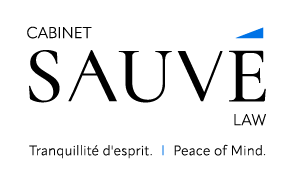Your Ontario Legal Guide to Real Estate Closing Costs
Beyond the Purchase Price: A Complete Guide to Real Estate Closing Costs in Ontario
You’ve done it. You navigated the competitive market, found the perfect home, and your offer was accepted. The excitement is palpable. But as the initial thrill settles, a common question begins to surface for many buyers in Ontario: "What other costs are involved?"
Beyond your down payment and mortgage, a series of expenses known as "closing costs" must be paid to finalize the transaction. For many, especially first-time homebuyers, these costs can be a source of significant stress and confusion. But they don’t have to be.
At Cabinet Sauvé Law, our motto is "Peace of Mind," and that begins with providing clarity. This guide is designed to demystify closing costs, breaking down each component so you can budget effectively and approach your closing day with confidence, not anxiety.
What Exactly Are Closing Costs?
Closing costs are a collection of one-time fees and charges associated with completing a real estate transaction. They are paid on or by the "closing day"—the day the ownership of the property is officially transferred to you. While your down payment goes towards the equity of your home, closing costs cover the administrative and legal services required to make that transfer happen legally and securely.
A common rule of thumb is to budget between 1.5% and 4% of the home's purchase price for closing costs. For a $600,000 home, this could range from $9,000 to $24,000. This is a wide range because the final amount depends heavily on the specific property and its price. Let's break down the most significant components, below.
1. The Big One: Ontario’s Land Transfer Tax (LTT)
This is typically the largest closing cost you will encounter. The Land Transfer Tax is a provincial tax calculated as a percentage of the property’s value, using a series of marginal tax brackets. The higher the purchase price, the higher the tax rate.
The First-Time Homebuyer Rebate: A Crucial Exception
The good news for eligible first-time homebuyers in Ontario is the provincial rebate program. This program can significantly reduce or even eliminate the Land Transfer Tax burden. To qualify, you must be at least 18 years old, have never owned a home anywhere in the world, and intend to occupy the property as your principal residence.
As of 2025, the maximum rebate is $4,000, which completely covers the LTT on homes purchased for up to $368,333. For homes purchased above this price, eligible buyers still receive the full $4,000 rebate, which is deducted from the total LTT payable. Your real estate lawyer is essential in ensuring the correct forms are filed to claim this rebate.
2. Legal Fees and Disbursements
This is what you pay your lawyer for their expertise and for the work they do to protect your interests. It’s important to understand this cost is typically broken into two parts: the legal fee and the disbursements.
- Legal Fees: This is the fee your lawyer charges for their professional services. This covers their time and expertise in reviewing the Agreement of Purchase and Sale, searching the property's title for any issues, ensuring there are no liens or outstanding work orders, communicating with the seller's lawyer and your lender, and preparing all the legal documentation to put the home in your name.
- Disbursements: These are the out-of-pocket expenses your lawyer incurs on your behalf to complete the transaction. Think of your lawyer as paying for necessary third-party services upfront, which you then reimburse them for on closing. Common disbursements include:
- Title Search: To verify the legal ownership of the property and uncover any registered claims.
- Execution Searches: To ensure the previous owners do not have outstanding judgments against them that could affect the property.
- Document Registration: The fee charged by the provincial government to register the deed (transfer) and your mortgage on title.
- Software Fees: Modern real estate transactions rely on specialized software to manage documents and funds securely.
- Couriers and Postage: For the secure delivery of documents and certified cheques.
3. Title Insurance: Your Long-Term Protection
We've already covered Title Insurance in a previous Blog post, but here is a bit of a recap for you. While a title search is thorough, it cannot protect against hidden or unknown issues. That’s where title insurance comes in. For a one-time fee (premium), a title insurance policy protects you—for as long as you own the property—against a host of potential problems, including:
- Title fraud (someone attempting to mortgage or sell your home without your knowledge).
- Unknown title defects that were not discoverable in a search.
- Existing liens against the property (e.g., from unpaid debts by a previous owner).
- Encroachment issues (e.g., a neighbour's shed is partially on your land).
- Zoning or work order issues from the municipality.
Your lawyer will arrange for this policy as part of the closing process. It is a small price to pay for enduring Peace of Mind.
4. Statement of Adjustments: Balancing the Books
The seller may have prepaid for certain services related to the property for a period of time when you will be the owner. The "Statement of Adjustments" is a document prepared by the seller's lawyer to reconcile these costs. You will be responsible for reimbursing the seller for your portion of these prepaid expenses.
Common adjustments can include:
- Property Taxes: If the seller prepaid their property taxes for the entire year, you will have to refund them the amount covering the period from the closing date to the end of the year.
- Condominium Fees: If you are buying a condo, you will need to reimburse the seller for any prepaid monthly maintenance fees.
- Utilities: In some cases, especially in rural areas like Angus, you may need to reimburse the seller for a full tank of heating oil or propane.
5. Other Potential Costs to Budget For
Finally, there are several other expenses that, while not always appearing on your lawyer’s final bill, are essential to budget for around the closing date:
- Home Inspection: Usually completed before the deal is finalized, but it's an important cost to remember.
- Appraisal Fee: Your mortgage lender will likely require an appraisal to confirm the value of the property, and this fee is often paid by the buyer.
- Property Insurance: Your lender will require you to have fire and property insurance in place, effective from the closing date.
- HST on New Construction: While resale homes are generally exempt, HST is typically payable on newly built homes. The builder often includes it in the price, but it's critical to confirm.
Your Partner for a Smooth Closing
Navigating real estate closing costs can seem daunting, but with the right legal partner, it becomes a clear and manageable process. At Cabinet Sauvé Law, we take the time to walk our clients through every document and every line item. We ensure there are no surprises on closing day, providing the clarity and professional oversight you need to protect your investment.
If you are buying a home in Ontario—from Ottawa and Rockland to Barrie, Simcoe County and Muskoka—we are here to help. Contact us today to discuss your upcoming real estate transaction and let us provide you with the Peace of Mind you deserve.




